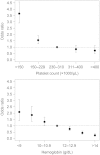Use and safety of heparin-free maintenance hemodialysis in the USA
- PMID: 23563280
- PMCID: PMC3888305
- DOI: 10.1093/ndt/gft067
Use and safety of heparin-free maintenance hemodialysis in the USA
Abstract
Background: Although heparin is used to anticoagulate the extracorporeal circuit for most patients on maintenance hemodialysis (HD), some patients undergo heparin-free HD. We describe the determinants of heparin-free HD and its association with adverse outcomes using data from a national dialysis provider merged with Medicare claims.
Methods: We identified patients aged ≥67 years with no recent history of warfarin use who initiated maintenance HD from 2007 to 2008. We applied the Cox regression to a propensity score-matched cohort to estimate the hazards of all-cause mortality, bleeding (gastrointestinal hemorrhage, hemorrhagic stroke, other hemorrhage), atherothrombosis (ischemic stroke, myocardial infarction) and venous thromboembolism (VTE) (deep vein thrombosis, pulmonary embolism).
Results: Among 12 468 patients, 836 (6.7%) were dialyzed heparin-free. In multivariable-adjusted analyses, a history of gastrointestinal bleeding, hemorrhagic stroke and lower hemoglobin and platelet counts were associated with higher odds of heparin-free HD. Heparin-free HD use also varied as much as 4-fold by facility region. We found no significant association of heparin-free HD with all-cause mortality [hazard ratio (HR) 1.08; 95% confidence interval (CI): 0.94-1.26], bleeding (HR 1.15; 95% CI: 0.83-1.60), atherothrombosis (HR 1.09, 95% CI: 0.90-1.31) or VTE (HR 1.23, 95% CI: 0.93-1.64) compared with HD with heparin.
Conclusions: Patient markers of increased risk of bleeding and facility region associated with heparin-free HD use. Despite the potential benefits of avoiding heparin use, heparin-free HD was not significantly associated with decreased hazards of death, bleeding or thrombosis, suggesting that it may be no safer than HD with heparin.
Keywords: anti-coagulation; gastrointestinal bleeding; hemodialysis; heparin; heparin-free.
Figures




Comment in
-
Dialysis: Heparin-free haemodialysis--use and outcomes.Nat Rev Nephrol. 2013 Jul;9(7):381-2. doi: 10.1038/nrneph.2013.106. Epub 2013 Jun 4. Nat Rev Nephrol. 2013. PMID: 23732459 No abstract available.
References
-
- Reinecke H, Brand E, Mesters R, et al. Dilemmas in the management of atrial fibrillation in chronic kidney disease. J Am Soc Nephrol. 2009;20:705–711. - PubMed
-
- Phelan PJ, O'Kelly P, Holian J, et al. Warfarin use in hemodialysis patients: what is the risk? Clin Nephrol. 2011;75:204–211. - PubMed
-
- Pinson CW, Schuman ES, Gross GF, Schuman TA, Hayes JF. Surgery in long-term dialysis patients. Experience with more than 300 cases. Am J Surg. 1986;151:567–571. - PubMed
Publication types
MeSH terms
Substances
Grants and funding
LinkOut - more resources
Full Text Sources
Other Literature Sources
Medical

